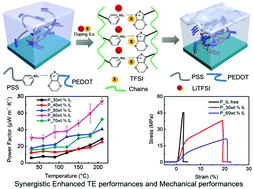Synergistic enhancement of thermoelectric and mechanical performances of ionic liquid LiTFSI modulated PEDOT flexible films†
Abstract
Flexible thermoelectric films have received increasing attentions due to their ability to generate power for use in vigorous wearable electronics and internet of things (IoT) sensors. In this study, synergistic enhancements in both the thermoelectric and mechanical performances of poly(3,4-ethylenedioxythiophene) (PEDOT)-based flexible thermoelectric films were obtained by utilizing the modulation effect of an ionic liquid (IL), in this case bis(trifluoromethane)sulfonimide lithium salt (LiTFSI). The electrical conductivity of the as-fabricated ionic liquid/poly(3,4-ethylenedioxythiophene)–poly(styrenesulfonate) (IL/PEDOT:PSS) films increased from 5 S cm−1 (IL-free PEDOT) to nearly 1000 S cm−1 (PEDOT with 60 wt% IL content). Simultaneously, the thermoelectric power factor of the PEDOT thin film was boosted by nearly two orders from less than 1 μW m−1 K−2 to 75 μW m−1 K−2 due to the modulated electrical conductivity and enhanced Seebeck coefficient with increasing temperature. Furthermore, mechanical bending tests showed that the electrical conductivity change was less than 0.03% after 10 000 bending cycles, which is much better than that of the IL-free film, suggesting good bendability. The tensile test indicated enhancements in the tensile strain of free-standing films from less than 3% to more than 20% before and after adding LiTFSI into PEDOT:PSS. X-ray diffraction (XRD) and Raman measurements demonstrated that the enhancements in both the thermoelectric and mechanical performances were related to the increased ordering structure due to the weak chemical bonding effect between PEDOT and the ILs. The as-prepared IL/PEDOT:PSS thermoelectric films have promising applications for wearable electronics.



 Please wait while we load your content...
Please wait while we load your content...